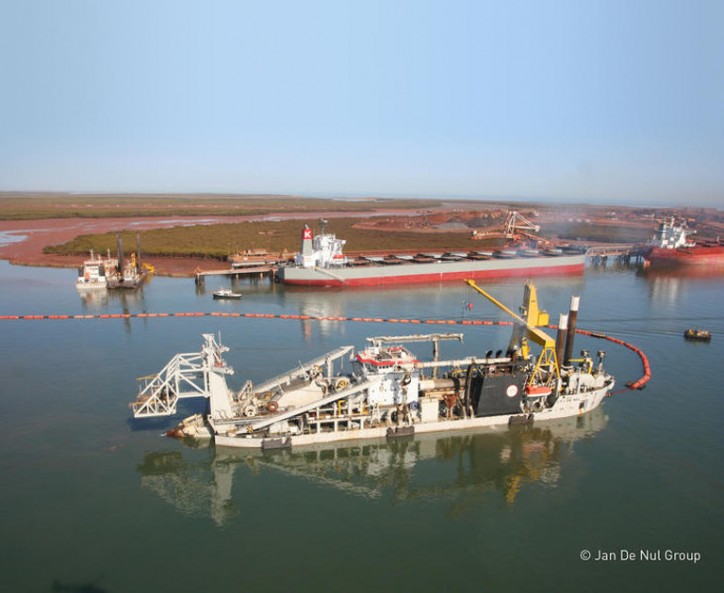Port of Quequén and Port of Bahía Blanca contract Jan De Nul for their expansion plans
Jan De Nul Group was awarded major contracts in two Argentinean ports in the course of June 2018. The first contract for the 50-feet deepening dredging works of the Port of Quequén was signed with Jan De Nul on 1 June 2018. The second project concerns the maintenance dredging of the Port of Bahía Blanca and was awarded on 8 June 2018 to a consortium comprising Jan De Nul and Boskalis.
“We are delighted to have been awarded these major contracts,” says Jan Neckebroeck, Area Manager Latin America at Jan De Nul Group. “They both confirm our position in Argentina, one of our key markets since many years.”

Royal visit to Argentina
After the signing of the first contract on 1 June, the agreement for the 50-feet Deepening Dredging Works of the Port of Quequén was officially signed yesterday evening during a formal signing ceremony in the presence of Princess Astrid of Belgium. The Princess is currently presiding the Belgian economic mission through Argentina and Uruguay. She is accompanied by the Foreign Minister of Belgium, Mr. Didier Reynders, and a large delegation of ministers, international journalists, businessmen and investors of her country. This bilateral meeting with the European Royalty allows the Port of Quequén to showcase the opportunities of potential investments in the maritime hub of Quequén.
With this contract, the Port of Quequén continues its collaboration with Jan De Nul, since the company already performed six maintenance campaigns during the last three years, from March 2015 to March 2018, a contract which was also awarded through an international public bid.
Quequén opens for larger cargos
In order to open the Port of Quequén for vessels over 46 feet, deepening dredging works need to be performed in the external and internal access channel, as well as in the inner port basin. These works fit within the Port’s 2016-2026 Strategic Plan, aiming at a port depth of approximately 50 feet.
Jan De Nul will deploy one of its most powerful Cutter Suction Dredgers, Ibn Battuta, to cut the hard material and Trailing Suction Hopper Dredger Vitus Bering to dredge the pre-cut material and dispose it at sea.
“We will start dredging in October-November and finish within four months. Additionally, we will maintain the depth of the port during the next seven years,” says Bob Michta, Manager Argentina Office of Jan De Nul. “This contract shows that Argentina is open for investments, fully financed by the private sector”.
After completion of the deepening dredging works, Jan De Nul will maintain the depth of the port during 12 maintenance campaigns over a 7-year period. The overall depth of the port will then be increased with one meter, to a final depth of 50 feet.
Bahía Blanca continues its long collaboration with Jan De Nul
The consortium comprising Jan De Nul and Boskalis signed the contract for the maintenance of the Port of Bahía Blanca. The dredging works need to be performed with a 3 feet overdepth, which will create a buffer in order to provide several months of draught certainty. The works will commence in July.
“We have been working for the Port of Bahía Blanca for more than ten years now, and this award strengthens our long relationship. We hope to be able to continue this for many years to come,” concludes Bob Michta of Jan De Nul Group.
Social and economic impact
Both projects are important for Argentina. The Port of Bahía Blanca handles large export of grain, oil and fertilizer. It is one of the most important ports in Argentina as it is the only one that is naturally 42 feet deep. The main channel is kept at 50 feet by regular maintenance, for which the consortium is contracted.
The deepening dredging works in the Port of Quequén will allow the port to reduce waiting times, optimize processes and minimize costs. The deepening of the port will directly lead to a reduction of 25% in port costs and will enhance the economic position of the port tremendously, since it will be able to operate more and larger cargos, having an imminent impact on direct and indirect employment. This will also result in an expansion and strengthening of the Argentinean Hinterland. More companies will be interested in settling in this new influencing area, expanding their activities in the Port of Quequén.
Source: Jan de Nul